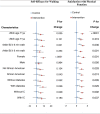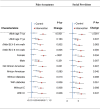A group-mediated, home-based physical activity intervention for patients with peripheral artery disease: effects on social and psychological function
- PMID: 24467875
- PMCID: PMC3910685
- DOI: 10.1186/1479-5876-12-29
A group-mediated, home-based physical activity intervention for patients with peripheral artery disease: effects on social and psychological function
Abstract
Background: PAD is a disabling, chronic condition of the lower extremities that affects approximately 8 million people in the United States. The purpose of this study was to determine whether an innovative home-based walking exercise program for patients with peripheral artery disease (PAD) improves self-efficacy for walking, desire for physical competence, satisfaction for physical functioning, social functioning, and acceptance of PAD related pain and discomfort.
Methods: The design was a 6-month randomized controlled clinical trial of 194 patients with PAD. Participants were randomized to 1 of 2 parallel groups: a home-based group-mediated cognitive behavioral walking intervention or an attention control condition.
Results: Of the 194 participants randomized, 178 completed the baseline and 6-month follow-up visit. The mean age was 70.66 (±9.44) and was equally represented by men and women. Close to half of the cohort was African American. Following 6-months of treatment, the intervention group experienced greater improvement on self-efficacy (p = .0008), satisfaction with functioning (p = .0003), pain acceptance (p = .0002), and social functioning (p = .0008) than the control group; the effects were consistent across a number of potential moderating variables. Change in these outcomes was essentially independent of change in 6-minute walk performance.
Trial registration: [ClinicalTrials.gov Identifier: NCT00693940].
Figures


References
Publication types
MeSH terms
Associated data
Grants and funding
LinkOut - more resources
Full Text Sources
Other Literature Sources
Medical

